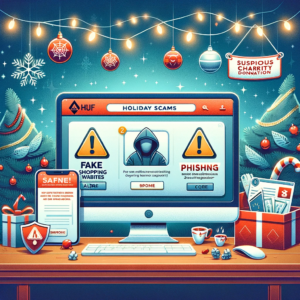Your Essential Guide To Safeguarding Against Holiday Scams
Beware of Holiday Scams
 As the holiday season rolls in with its cheer and charm, it’s crucial to remember that it’s also prime time for holiday scams.
As the holiday season rolls in with its cheer and charm, it’s crucial to remember that it’s also prime time for holiday scams.
These scams, unfortunately, have become as much a part of the season as gift-giving and festive lights. However, with the right knowledge and precautions, you can protect yourself and enjoy the season without falling victim to these clever schemes.
Understanding Holiday Scams
Holiday scams come in various forms, but they all have one goal: to steal your money or personal information.
Cybercriminals get creative during the holidays, tailoring their scams to the season.
Some of the most common holiday scams include:
- Fake websites offering too-good-to-be-true deals
- Phishing emails and texts pretending to be from legitimate sources
- Charity scams that play on your generosity
Identifying Fake Shopping Sites
One of the hallmarks of the holiday season is shopping. Unfortunately, it’s also a peak time for online shopping scams.
Fraudsters create fake websites that mimic legitimate retailers, offering incredible discounts on popular items. These sites might look genuine, but they’re designed to steal your credit card information or install malware on your device.
A huge phishing scam this time of year is the old fake package delivery or missed delivery text or email. Scammers often send emails or texts posing as couriers (USPS, UPS, FedEx, etc.), with links that can steal your information. Always verify directly with the delivery service and never click on links in unsolicited messages.
To avoid these holiday scams, always verify the website’s authenticity before making a purchase. Most times, the website URL address will be slightly off from the real address. Sometimes they will sneak in a 4 for an A.
Check for secure payment methods, read customer reviews, and look for contact information on the site.
Steering Clear of Phishing Attempts
Phishing is another common tactic in holiday scams. You might receive emails or messages that appear to be from legitimate companies or financial institutions. They you to click on a link or provide personal information.
These scammers go as far as creati a cloned website for the financial intitution they are representing. During a cyber security presentation I recently attended, it was shown to us first hand how quickly andeasily these criminals can clone a legitimate website. In a matter of 3 minutes, they cloned the website and send out thousands of emails linking back to the fake website with the intent of stealing login information or other personal information.
These are attempts to steal your identity or financial details. Always be cautious with unsolicited emails. Check the sender’s email address, avoid clicking on links, and never share personal information unless you are absolutely sure of the sender’s identity.
Avoiding Charity Scams
The holiday season is a time for giving, and scammers exploit this by creating fake charity organizations.
Before donating, do thorough research to ensure the charity is legitimate. Verify their credentials and look for reviews or reports about their work. It’s always safer to donate to well-known and established charities. And give to your local charities directly if have the chance to do so.
To reiterate something from above, these fraudsters will also create cloned websites that look almost identical to the real charity in order to steal your donations.
You have to be real careful here. Even if you unknowingly give money to an organization tht is on the federal watch list, you could find yourself in some real hot water with the feds.
General Tips for Avoiding Holiday Scams
- Stay Informed: Knowledge is power. Be aware of the latest holiday scams circulating and how they work.
- Use Secure Payment Methods: When shopping online, use secure payment methods like credit cards or reputable payment services. Avoid direct bank transfers to unknown entities.
- Update Your Security Software: Ensure your devices are protected with the latest security software. This can help prevent malware and other cyber threats.
- Trust Your Instincts: If a deal or offer seems too good to be true, it probably is. Always listen to your gut feeling.
What if Your Fall For One of These Holiday Scams?
If you unfortunately fall victim to identity theft, it’s crucial to act swiftly. Your first step should be to contact your insurance agent to check if your policy includes identity theft coverage.
At Huff Insurance, we understand the complexities and challenges of identity recovery. Our team is dedicated to assisting you in verifying whether your existing policies provide protection against identity theft. This coverage can be invaluable in helping you navigate the process of restoring your identity and financial health.
Remember, prompt action and having the right protection in place can make a significant difference in mitigating the impact of identity theft.
More Resources and Blogs on Scams
Don’t fall victim to one of today’s scam’s
Beware of These Current Scam’s
Conclusion
These criminial organizations are set up all over the worls and their sole intent is to separate you from your money or information.
While holiday scams can dampen the festive spirit, being aware and prepared can go a long way in protecting yourself.
By understanding these scams, staying vigilant, and following the tips mentioned above, you can ensure a safe and joyous holiday season. Remember, the best gift you can give yourself and your loved ones is the security of your personal and financial information.
Stay safe, and enjoy the holidays!
